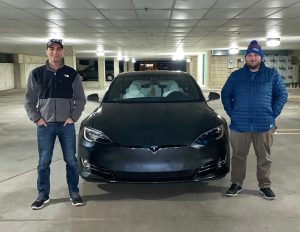“It’s Electric! Boogie woogie, woogie”
Tesla’s innovations are driving demands, with legal trends following
by Angelo Saba III, Adjunct Professor, General Education, Business, Technology, and Advanced Manufacturing
My brother-in-law drives a Tesla Model S P100D. The midnight silver metallic color glistens like a flawless diamond, even on the foggiest of days. He charges his car in his garage, and his kilowatt use is less than the amount I need to spend at Stop and Shop to benefit from their fuel rewards program. Something’s wrong here.
From afar, his car resembles a 2020 Mazda 6, but up close and personal, it’s as distinct and silent, like nothing I’ve seen or heard before. Zoom, zoom? Nope. More like shh, shh.
Out of paranoia and fear from the unexpected outcomes of not acclimating well to drastic change, I admit that in 2018, I did not think Tesla could profit. I believed the critics, and I idled after reading about their cash flow problems. Note to self: electric vehicles technically don’t idle since they only spin the drive motor when the vehicle is moving, so the joke’s on me.
After reporting fourth-quarter earnings on January 29, 2020, Tesla profited $105 million in net income. Quite the impressive 2020 start in comparison to a 2019 that ended in $862 million in total losses. Except, something far greater is occurring. To the dismay of Ford and General Motors, Tesla’s combined market capitalization is now worth more. Their will to transform the industry from fuel to electric has driven past both, and while some believe it is in reckless pursuit to change the world, it’s not. Their growth seems more calculated than ever before.
A record delivery of 97,000 cars in the past third quarter, another 112,000 in the fourth quarter, and now a valuation that surpasses $1 billion is so significant that their upward trajectory suggest times of sustainability are finally on the horizon.
Soon, after a rather large legal battle in Michigan is resolved, Tesla is going to be allowed to deliver cars to customers in the state through a subsidiary. The upending of dealer-franchise laws with its direct-to-consumer sales model is worth more attention.
Traditional automakers that own conventional dealerships will need to get creative to fight back, but the writing is on the wall. The Michigan case has even laid the legal framework for northeastern sidestep dealers to startup. New York and Massachusetts, for example, already have made Tesla’s direct-to-consumers business model legal, but Connecticut has not. For how long, though? It’s hard to imagine that Tesla shoppers in Connecticut who have to go to Mount Kisco, New York, to buy a vehicle will let this inconvenience continue for long.
The same change is unfolding on the service side. Interestingly, Louisiana bans direct-to-customer sales, but the state legally allows for service centers, and similarly in 2019 in Texas, the law was revised so owners could get their Teslas repaired. Such progress and autonomy in relation to automaker franchise laws is soon going to allow Tesla to challenge each of the 16 restricting states in permitting dealerships and service centers. While the struggle between Tesla and individual states will linger, the competition for manufacturing and selling electric vehicles will likely force inhibiting states to avoid their established protectionist stance.
Perhaps Tesla’s influence on state laws is worth federal legislation on direct-to-customer sales, but for now, Tesla shareholders and call option owners alike rejoice, “It’s electric. Boogie woogie, woogie.”
Learn more about Goodwin University’s Business Administration programs.

Professor Angelo Saba III graduated from the University of Connecticut with a Bachelor of Arts in History and a Master of Arts in Curriculum and Instruction. In 2016, Professor Saba joined Goodwin University as an adjunct teaching on-ground and online courses of BUS 110, COM 105 and IDA 120. He is a full-time social studies teacher at Westbrook High School, where he also coaches middle school basketball and junior varsity high school baseball. His secondary level teaching practice includes work in A.P. Psychology, American Law and Civics and since 2015 he has maintained an active audit of College Board’s requirements for teaching Advanced Placement classes. As a small business owner of Résumés by Angelo LLC, he also specializes in résumé and CV design. Honors and awards include: National Youth Leadership Forum Honorary Member; Westbrook Public Schools Teacher of the Year Award Nominee; NEAG School of Education Outstanding Early Career Professional Award Nominee; and University of Connecticut’s New England Scholar Recipient.
Goodwin University is a nonprofit institution of higher education and is accredited by the New England Commission of Higher Education (NECHE), formerly known as the New England Association of Schools and Colleges (NEASC). Goodwin University was founded in 1999, with the goal of serving a diverse student population with career-focused degree programs that lead to strong employment outcomes.

